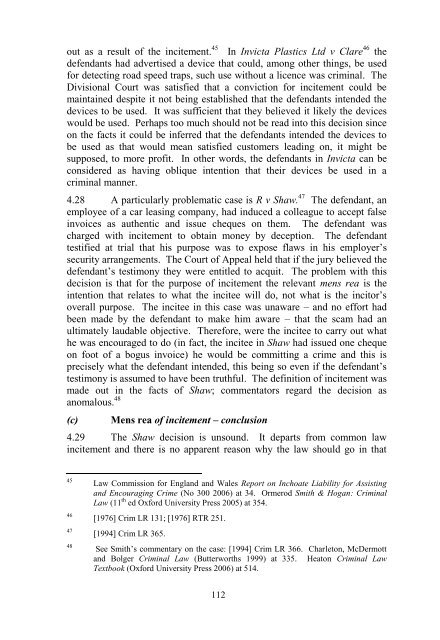Consultation Paper on Inchoate Offences - Law Reform Commission
Consultation Paper on Inchoate Offences - Law Reform Commission
Consultation Paper on Inchoate Offences - Law Reform Commission
Create successful ePaper yourself
Turn your PDF publications into a flip-book with our unique Google optimized e-Paper software.
out as a result of the incitement. 45 In Invicta Plastics Ltd v Clare 46 thedefendants had advertised a device that could, am<strong>on</strong>g other things, be usedfor detecting road speed traps, such use without a licence was criminal. TheDivisi<strong>on</strong>al Court was satisfied that a c<strong>on</strong>victi<strong>on</strong> for incitement could bemaintained despite it not being established that the defendants intended thedevices to be used. It was sufficient that they believed it likely the deviceswould be used. Perhaps too much should not be read into this decisi<strong>on</strong> since<strong>on</strong> the facts it could be inferred that the defendants intended the devices tobe used as that would mean satisfied customers leading <strong>on</strong>, it might besupposed, to more profit. In other words, the defendants in Invicta can bec<strong>on</strong>sidered as having oblique intenti<strong>on</strong> that their devices be used in acriminal manner.4.28 A particularly problematic case is R v Shaw. 47 The defendant, anemployee of a car leasing company, had induced a colleague to accept falseinvoices as authentic and issue cheques <strong>on</strong> them. The defendant wascharged with incitement to obtain m<strong>on</strong>ey by decepti<strong>on</strong>. The defendanttestified at trial that his purpose was to expose flaws in his employer‟ssecurity arrangements. The Court of Appeal held that if the jury believed thedefendant‟s testim<strong>on</strong>y they were entitled to acquit. The problem with thisdecisi<strong>on</strong> is that for the purpose of incitement the relevant mens rea is theintenti<strong>on</strong> that relates to what the incitee will do, not what is the incitor‟soverall purpose. The incitee in this case was unaware – and no effort hadbeen made by the defendant to make him aware – that the scam had anultimately laudable objective. Therefore, were the incitee to carry out whathe was encouraged to do (in fact, the incitee in Shaw had issued <strong>on</strong>e cheque<strong>on</strong> foot of a bogus invoice) he would be committing a crime and this isprecisely what the defendant intended, this being so even if the defendant‟stestim<strong>on</strong>y is assumed to have been truthful. The definiti<strong>on</strong> of incitement wasmade out in the facts of Shaw; commentators regard the decisi<strong>on</strong> asanomalous. 48(c)Mens rea of incitement – c<strong>on</strong>clusi<strong>on</strong>4.29 The Shaw decisi<strong>on</strong> is unsound. It departs from comm<strong>on</strong> lawincitement and there is no apparent reas<strong>on</strong> why the law should go in that45464748<strong>Law</strong> Commissi<strong>on</strong> for England and Wales Report <strong>on</strong> <strong>Inchoate</strong> Liability for Assistingand Encouraging Crime (No 300 2006) at 34. Ormerod Smith & Hogan: Criminal<strong>Law</strong> (11 th ed Oxford University Press 2005) at 354.[1976] Crim LR 131; [1976] RTR 251.[1994] Crim LR 365.See Smith‟s commentary <strong>on</strong> the case: [1994] Crim LR 366. Charlet<strong>on</strong>, McDermottand Bolger Criminal <strong>Law</strong> (Butterworths 1999) at 335. Heat<strong>on</strong> Criminal <strong>Law</strong>Textbook (Oxford University Press 2006) at 514.112
















